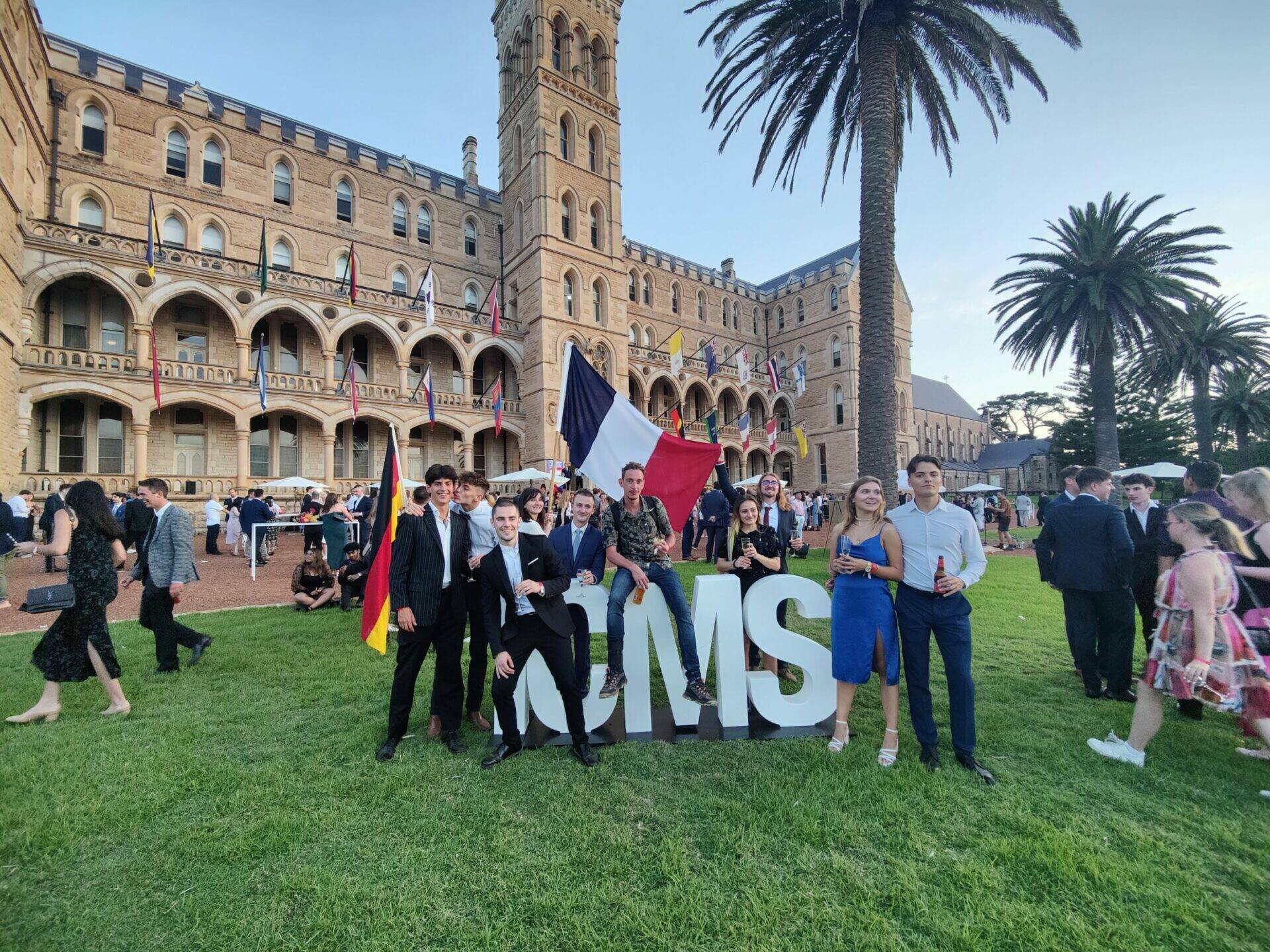Sports event manager
HOW TO BECOME A SPORTS EVENT MANAGER
Sports is mostly about matches, competitions and large gatherings that allow fans to see the greatest professional athletes in action. Behind all of these events, there are professional organizers such as sports event managers.
What is a sports event manager?
Whether it’s the FIFA Women’s World Cup in 2019, Roland Garros every year or the Paris Olympics in 2024, France regularly hosts major international sports events. While these events attract the most media coverage and reach the greatest number of people, a large number of competitions take place in French stadiums every week. Whether the event is global or local, organization is key. This is why clubs, federations or venues work with sports event managers.
Sports event managers are the mainstay of the various sports events that take place every year, such as soccer championships, tennis tournaments, swimming competitions, basketball games, ceremonies (awards, inaugurations, etc.), trade shows, etc.
In fact, they are responsible for developing these events and overseeing their organization from start to finish. To this end, they must scrupulously follow the specifications agreed with customers. These customers may be institutions or organizations, such as international sports federations (UEFA, FIFA, IOC, etc.) or professional clubs.
Beyond organizational skills, sports event managers must demonstrate management and administrative skills, as well an understanding of the law, which is key to successfully carrying out their projects.
Whether it is logistics, budget, regulations, security of the venues, staff, pop-up events, guests, etc. sports event managers cannot leave anything to chance! Everything is meticulously organized to guarantee memorable sporting events.
Sports event managers must be extremely available. The role entails frequent and often long-distance travels. Indeed, sports events can take place both at home and abroad.
They must also demonstrate great flexibility and patience, as, depending on the scope of the event, they may have to work on the same project for several weeks, months and even years! For example, events such as the Rugby World Cup or the Olympics take several years to organize.
In fact, they have the same responsibilities as a traditional project manager, but in the field of sports and events organization. The key is to be organized, conquering and, above all, able to anticipate last-minute problems that can arise during such events.
What are the duties of a sports event manager?
Sports events are some of the favorite forms of entertainment for a large part of the population. As a result, sports event managers go out of their way to please both the larger public and the athletes who compete. To this end, their work involves duties such as:
- Designing and organizing a sporting event: choice of venues, participants, vendors, etc. The event must be remarkably well-organized to avoid any unforeseen circumstances. In case of problems, the project manager must be able to find solutions
- Developing a unique concept : the aim of such projects is to promote and broadcast sports events as well as to please spectators who expect a real show
- Promote the event : using their communication and advertising skills, sports event managers are in charge of publicizing the event for everyone to see
- Coordination and planning of event in compliance with budget and set deadlines
- Managing a team
- Implementing the ticket booking and sales process
- Hosting meeting with clients
In short, sports event managers must demonstrate a broad range of skills and be ever-present in the project’s development.
Key qualities and skills required of a sports event manager
To stand out from the crowd and be the best facing the competition, several skills are required as well as certain qualities which are essential to the role of sports event manager.
The most valuable being in-depth knowledge of sports practices. Sports event managers must know the ins and outs of the sports milieu, in terms of history, development, regulations, athletes, coaches, referees, etc. In addition to their knowledge of sports, they must also demonstrate thorough general knowledge.
The job requires a lot of precision and patience. Sports event managers must have good organization skills as well as the ability to analyze and anticipate risks.
And of course, excellent interpersonal skills are a must! As they work in constant contact with people, sports event managers are open, friendly and highly communicative individuals. In fact, these are the qualities that will help project leads manage a team, and above all, make the most of their commercial skills when negotiating with vendors.
Finally, the following qualities are essential:
- Self-reliance
- A flair for creativity and innovation
- Good listening skills
- Fluent English
- Good stress management skills
Salary range and career prospects
A sports event manager’s compensation is variable. However, remuneration remains attractive as this is a position with responsibility.
Early in their career, sports event managers can expect a gross monthly salary of around €2,000. With experience, their salary can rise to €3,500 gross monthly.
Compensation also depends on the structure that employs them and on project size.
With time and experience, sports event managers may move on to the position of logistics manager, communication manager or sports event manager for larger organizations.
Sports event managers are typically employed by events agencies, companies, institutions or for sponsors.
What are the qualifications required to become a sports event manager?
Candidates to the sports event management career must have graduated from high school (French baccalauréat). Afterwards, they should ideally continue studying at least for a three-year college degree (Bac+3) opting for a Bachelor’s in Sports Careers. To those looking to take on more responsibility and developing their knowledge in the field, we recommend studying for a five-year college degree.
Candidates to the sports event management career may study at a school specializing in events management, communication or at a school specializing in sports.
The sports event management career demands a lot from one person. Young graduates will certainly need to be tenacious and strong-willed if they are to make their way into the tough world of events management.
A booming industry, sports business attracts more and more young people. Therefore, pursuing a career in sports events is an excellent way to gain a foothold in the world of sports, while combining business and fun.
Whether it’s the FIFA Women’s World Cup in 2019, Roland Garros every year or the Paris Olympics in 2024, France regularly hosts major international sports events. While these events attract the most media coverage and reach the greatest number of people, a large number of competitions take place in French stadiums every week. Whether the event is global or local, organization is key. This is why clubs, federations or venues work with sports event managers.
Sports event managers are the mainstay of the various sports events that take place every year, such as soccer championships, tennis tournaments, swimming competitions, basketball games, ceremonies (awards, inaugurations, etc.), trade shows, etc.
In fact, they are responsible for developing these events and overseeing their organization from start to finish. To this end, they must scrupulously follow the specifications agreed with customers. These customers may be institutions or organizations, such as international sports federations (UEFA, FIFA, IOC, etc.) or professional clubs.
Beyond organizational skills, sports event managers must demonstrate management and administrative skills, as well an understanding of the law, which is key to successfully carrying out their projects.
Whether it is logistics, budget, regulations, security of the venues, staff, pop-up events, guests, etc. sports event managers cannot leave anything to chance! Everything is meticulously organized to guarantee memorable sporting events.
Sports event managers must be extremely available. The role entails frequent and often long-distance travels. Indeed, sports events can take place both at home and abroad.
They must also demonstrate great flexibility and patience, as, depending on the scope of the event, they may have to work on the same project for several weeks, months and even years! For example, events such as the Rugby World Cup or the Olympics take several years to organize.
In fact, they have the same responsibilities as a traditional project manager, but in the field of sports and events organization. The key is to be organized, conquering and, above all, able to anticipate last-minute problems that can arise during such events.
Sports events are some of the favorite forms of entertainment for a large part of the population. As a result, sports event managers go out of their way to please both the larger public and the athletes who compete. To this end, their work involves duties such as:
- Designing and organizing a sporting event: choice of venues, participants, vendors, etc. The event must be remarkably well-organized to avoid any unforeseen circumstances. In case of problems, the project manager must be able to find solutions
- Developing a unique concept : the aim of such projects is to promote and broadcast sports events as well as to please spectators who expect a real show
- Promote the event : using their communication and advertising skills, sports event managers are in charge of publicizing the event for everyone to see
- Coordination and planning of event in compliance with budget and set deadlines
- Managing a team
- Implementing the ticket booking and sales process
- Hosting meeting with clients
In short, sports event managers must demonstrate a broad range of skills and be ever-present in the project’s development.
To stand out from the crowd and be the best facing the competition, several skills are required as well as certain qualities which are essential to the role of sports event manager.
The most valuable being in-depth knowledge of sports practices. Sports event managers must know the ins and outs of the sports milieu, in terms of history, development, regulations, athletes, coaches, referees, etc. In addition to their knowledge of sports, they must also demonstrate thorough general knowledge.
The job requires a lot of precision and patience. Sports event managers must have good organization skills as well as the ability to analyze and anticipate risks.
And of course, excellent interpersonal skills are a must! As they work in constant contact with people, sports event managers are open, friendly and highly communicative individuals. In fact, these are the qualities that will help project leads manage a team, and above all, make the most of their commercial skills when negotiating with vendors.
Finally, the following qualities are essential:
- Self-reliance
- A flair for creativity and innovation
- Good listening skills
- Fluent English
- Good stress management skills
A sports event manager’s compensation is variable. However, remuneration remains attractive as this is a position with responsibility.
Early in their career, sports event managers can expect a gross monthly salary of around €2,000. With experience, their salary can rise to €3,500 gross monthly.
Compensation also depends on the structure that employs them and on project size.
With time and experience, sports event managers may move on to the position of logistics manager, communication manager or sports event manager for larger organizations.
Sports event managers are typically employed by events agencies, companies, institutions or for sponsors.
Candidates to the sports event management career must have graduated from high school (French baccalauréat). Afterwards, they should ideally continue studying at least for a three-year college degree (Bac+3) opting for a Bachelor’s in Sports Careers. To those looking to take on more responsibility and developing their knowledge in the field, we recommend studying for a five-year college degree.
Candidates to the sports event management career may study at a school specializing in events management, communication or at a school specializing in sports.
The sports event management career demands a lot from one person. Young graduates will certainly need to be tenacious and strong-willed if they are to make their way into the tough world of events management.
A booming industry, sports business attracts more and more young people. Therefore, pursuing a career in sports events is an excellent way to gain a foothold in the world of sports, while combining business and fun.






